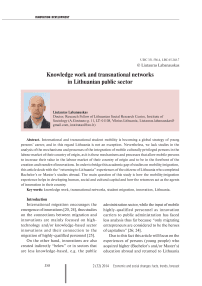Knowledge work and transnational networks in Lithuanian Public sector
Автор: Labanauskas Liutauras
Журнал: Economic and Social Changes: Facts, Trends, Forecast @volnc-esc-en
Рубрика: Innovation development
Статья в выпуске: 2 (32) т.7, 2014 года.
Бесплатный доступ
International and transnational student mobility is becoming a global strategy of young persons’ career, and in this regard Lithuania is not an exception. Nevertheless, we lack studies in the analysis of the mechanisms and processes of the integration of mobile culturally privileged persons in the labour market of their country of origin, as it is these mechanisms and processes that allow mobile persons to increase their value in the labour market of their country of origin and to be in the forefront of the creation and transfer of innovations. In order to bridge this academic gap of studies on mobility/migration, this article deals with the “returning to Lithuania” experiences of the citizens of Lithuania who completed Bachelor’s or Master’s studies abroad. The main question of this study is how the mobility/migration experience helps in developing human, social and cultural capital and how the returnees act as the agents of innovation in their country.
Knowledge work, transnational networks, student migration, innovation, lithuania
Короткий адрес: https://sciup.org/147223575
IDR: 147223575 | DOI: 10.15838/esc/2014.2.32.15
Список литературы Knowledge work and transnational networks in Lithuanian Public sector
- Aidis R., Krupickaitė D. Kaip Neiššvaistyti Protų: Lietuvos Studentų Nuostatos Emigruoti. Vilnius: Vilniaus universitetas, 2009.
- Aidis R., Krupickaitė D., Blinstrubaitė L. The Loss of Intellectual Potential: Migration Tendencies amongst University Students in Lithuania. Geografija, 2005, pp. 33-40.
- Bentley T. Learning Beyond the Classroom: Education for a Changing World. London: Routledge, 1998.
- Bourdieu P et al. The Weight of the World: Social Suffering in Contemporary Society. Stanford: Stanford University Press, 1993.
- Castles S., Miller M. J. The Age of Migration. International Population Movements in the Modern World (Fourth edition, revised and updated). London: Palgrave Macmillan, 2009.
- Cerase F. P. Expectations and Reality: A Case Study of Return Migration from the United States to Southern Italy. International Migration Review, 1974, Vol. 8, no. 2, pp.245-262.
- Chellaraj G., Maskus K. E., Mattoo A. The ontribution of Skilled Immigration and International Graduate Students to U.S. innovation. Policy Research Paper WPS3588. World Bank, 2005.
- Creswell J. W. Qualitative Inquiry and Research Design. London: Sage Publications, 2007.
- Dobravolskas A. Laisvos darbo jėgos judėjimo padariniai. Integracijos Žinios, 2001, no.5(25).
- Etninių tyrimų centras. Etniškumo studijos 2009/2. Migrantų integracija: trečiųjų šalių piliečiai, Nr. 2. Vilnius: Lietuvos mokslų akademijos leidykla, 2009.
- Favell A. Eurostars in Eurocities: Intra-European Highly Skilled Migration. Highly Skilled Migration into the 21st Century International Conference. London: Middlesex University, 2012.
- Florida R. The Flight of the Creative Class: The New Global Competition for Talent. New York: Harper Business, 2005.
- Hart D. M. Understanding Immigration in a National Systems of Innovation Framework. Science and Public Policy, 2007, vol.34, no.1, pp. 45-53.
- Hunt J., Gauthier-Loiselle M. How Much Does Immigration Boost Innovation? Bonn: IZA Discussion Paper no. 3921. Institute for the Study of Labor (IZA), 2009. Available at: http://ftp.iza.org/dp3921.pdf.
- Jucevičienė P., Viržintaitė R., Jucevičius G. Protų Nutekėjimo Reiškinys Ir Jo Atspindžio Lietuvos Intelektiniame Kapitale Bruožai: Žvalgomasis Tyrimas. Vilnius: Lietuvos mokslo taryba, 2002.
- Leonavičius V., Mažeikienė D. Lietuvos Mokslininkų Ir Tyrėjų Mobilumas. Vilnius: Studijų kokybės vertinimo centras, 2009-2010.
- Meissner D. Immigration and America’s Future: A New Chapter. New York: Migration Policy Institute, 2006.
- MIPEX III Index. Lithuania, Brussels: Brittish Council and Migration Policy Group, 2011. Pp. 122-127.
- Morkevičiuas V., Norkus Z. Šiuolaikinės Lietuvos Klasinė Struktūra: Neovėberiška Analizė. Sociologija. Mintis Ir Veiksmas, 2012, no.2(31), pp.75-152.
- UK Global Innovation: Engaging with New Countries, Regions and People. London: NESTA (National Endowment for Science, Technology and the Arts), 2008.
- Niebuhr A. Migration and Innovation: Does Cultural Diversity Matter for Regional R&D Activity? Papers in Regional Science, 2010, no.89, pp. 563-585.
- The Global Competition for Talent: Mobility of the Highly Skilled. Paris: OECD, 2008.
- Orfila-Sintes F., Mattsson J. Innovation Behavior in the Hotel Industry. Emerald Management Reviews, 2009, pp. 380-394.
- Paraskevopoulou A., Markova E., Williams A., Shaw G. Migration and Innovation at the Bottom End: Understanding the Role of Migrant Managers in Small Hotels in the Global City. Mobilities, 2012, pp. 389-414.
- Saxenian A. L. The New Argonauts: Regional Advantage in a Global Economy. Cambridge, MA: Harvard University Press, 2007.
- Schumpeter J. The Theory of Economic Development: an Inquiry into Profits, Capital, Credit, Interest, and the Business Cycle. Cambridge, MA: Harvard University Press, 1934.
- Sipavičienė A., Gaidys V., Dobrynina M. Grįžtamoji Migracija: Teorinės Įžvalgos Ir Situacija Lietuvoje. Vilnius: Europos migracijos tinklas, Tarptautinė migracijos organizacija, Socialinių tyrimų institutas, 2009.
- ŠMM. (2010). Lietuva Pagal Užsienyje Studijuojančio Jaunimo Skaičių -Ties ES Vidurkiu. Paimta 2011 m. 1 18 d. iš. Available at: http://www.smm.lt/naujienos/docs/kalbos/studiju_taptautiskumas.pdf
- Statistikos Departamentas. Lietuvos Respublikos 2011 Metų Visuotinio Gyventojų Ir Būstų Surašymo Ataskaita. Vilnius: Statistikos Departamentas, 2011.
- Stuen E.T., Mobarak A.M., Maskus K.E. Skilled Immigration and Innovation: Evidence from Enrolment Fluctuations in US Doctoral Programs. Cambridge, MA: National Bureau of Economic Research, 2010.
- Sundbo J. Management of Innovation in Services. The Service Industries Journal, 1997, pp.432-455.
- Taljūnaitė M. Pilietybė Ir Socialinė Europos Integracija. Vilnius: Mykolo Romerio universitetas, 2005.
- Taljūnaitė M. Tyrėjų Gebėjimų Ugdymas Lietuvai Integruojantis Į Europos Sąjungos Infrastruktūrą. Mokslo Straipsnių Rinkinys. Vilnius: Socialinių tyrimų institutas, 2008.
- Taljūnaitė M. L.-K. Tyrėjų mobilumas ir jo socialiniai aspektai. 2009. Available at: http://bit.ly/1opgxXx (accessed 03.05.2014).
- UCAS. (2010 m. February 8 d.). Application Numbers Hit Record Highs for the Fourth Year Running. Available at: http://bit.ly/1kwFzXI (accessed 03.05.2014).
- Williams A. M. Listen to Me, Learn with Me: International Migration and Knowledge Transfer. British Journal of Industrial Relations, 2007, no.45, pp. 361-382.


